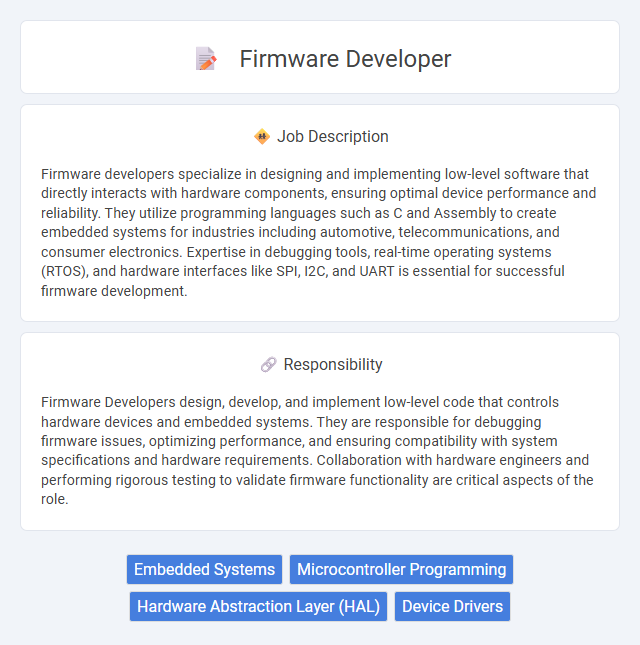
Firmware developers specialize in designing and implementing low-level software that directly interacts with hardware components, ensuring optimal device performance and reliability. They utilize programming languages such as C and Assembly to create embedded systems for industries including automotive, telecommunications, and consumer electronics. Expertise in debugging tools, real-time operating systems (RTOS), and hardware interfaces like SPI, I2C, and UART is essential for successful firmware development.
Individuals with strong analytical skills and a passion for low-level programming are likely well-suited for a firmware developer role. People who enjoy working closely with hardware components and solving complex, detail-oriented challenges may find satisfaction in this career. Conversely, those who prefer high-level, abstract software development or have difficulties with meticulous debugging might face challenges adapting to this position.
Qualification
Firmware developers must have a strong background in computer engineering or electrical engineering, typically holding a bachelor's degree in these fields. Proficiency in programming languages such as C and C++ and experience with embedded systems and microcontrollers are essential qualifications. Knowledge of hardware interfaces, debugging tools, and real-time operating systems (RTOS) further enhances a candidate's capability to design and implement efficient firmware.
Responsibility
Firmware Developers design, develop, and implement low-level code that controls hardware devices and embedded systems. They are responsible for debugging firmware issues, optimizing performance, and ensuring compatibility with system specifications and hardware requirements. Collaboration with hardware engineers and performing rigorous testing to validate firmware functionality are critical aspects of the role.
Benefit
A Firmware Developer position probably offers competitive salaries reflecting the specialized skills required to create low-level software for hardware devices. Benefits likely include opportunities for professional growth through exposure to cutting-edge technologies and collaboration with cross-functional teams. Health insurance, flexible working hours, and bonuses tied to project success could further enhance the overall compensation package.
Challenge
Firmware developer roles probably involve complex problem-solving challenges due to the need to write low-level code that interacts directly with hardware. The job likely demands continuous learning and adaptation to new technologies, firmware protocols, and debugging techniques. High expectations for reliability and efficiency in embedded systems might create a challenging but rewarding work environment.
Career Advancement
Firmware developers enhance their expertise by mastering embedded systems, C/C++ programming, and real-time operating systems, leading to advanced roles such as Senior Firmware Engineer or Embedded Systems Architect. Gaining proficiency in IoT technologies, cybersecurity protocols, and hardware-software integration significantly increases career growth opportunities. Continuous learning through certifications like Certified Embedded Systems Engineer (CESE) accelerates advancement and opens pathways to leadership positions.
Key Terms
Embedded Systems
Firmware Developers specializing in Embedded Systems design and implement low-level software that directly controls hardware components, ensuring efficient and reliable device operation. They utilize programming languages such as C and assembly to optimize system performance, while integrating real-time operating systems (RTOS) to manage hardware resources effectively. Expertise in debugging tools, hardware prototyping, and communication protocols like SPI, I2C, and UART is essential for developing robust embedded firmware solutions.
Microcontroller Programming
Firmware Developers specialize in designing and implementing low-level software that directly controls microcontroller hardware, ensuring optimal performance and reliability. Expertise in C/C++ programming, real-time operating systems (RTOS), and hardware interfaces like SPI, I2C, and UART is essential for efficient microcontroller programming. Proficiency in debugging tools, embedded systems architecture, and memory management enhances the development of robust firmware solutions for various embedded applications.
Hardware Abstraction Layer (HAL)
Firmware developers specializing in Hardware Abstraction Layer (HAL) design and implement low-level software that interfaces directly with microcontroller peripherals and hardware components. Expertise in HAL development ensures seamless communication between embedded hardware and higher-level application code, optimizing system performance and hardware compatibility. Proficiency in C/C++ programming, real-time operating systems (RTOS), and hardware datasheets is critical for creating efficient and scalable firmware solutions.
Device Drivers
Firmware Developers specializing in device drivers create and optimize low-level software that enables hardware components to communicate effectively with operating systems. They work extensively with embedded systems, utilizing programming languages such as C and C++ to develop drivers for peripherals like sensors, storage devices, and communication interfaces. Proficiency in hardware architecture, Real-Time Operating Systems (RTOS), and debugging tools ensures robust and efficient firmware performance across diverse electronic devices.
 kuljobs.com
kuljobs.com